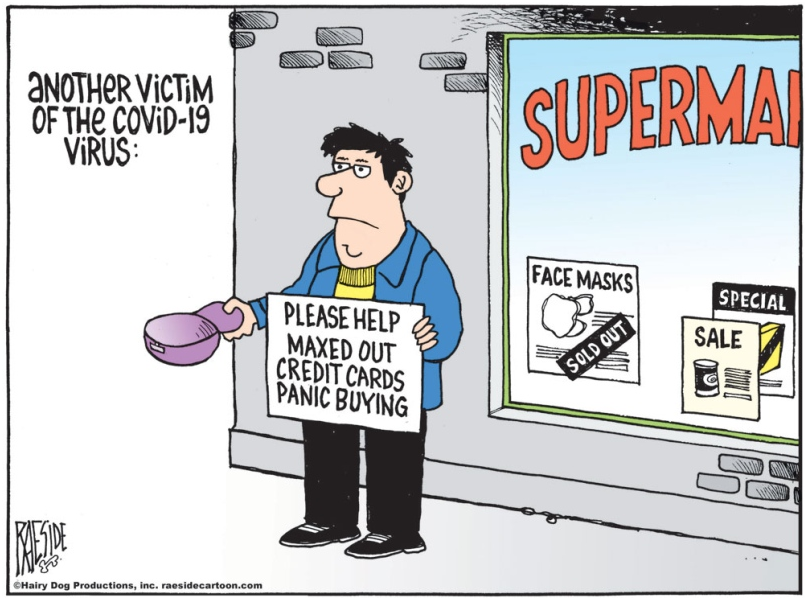The Resilience of Diversified Portfolios and the Human Spirit
27 March 2020

“In bear markets, stocks return to their rightful owners.”
—John Pierpont Morgan Sr (J.P Morgan)
As we head into the third month of the COVID-19 outbreak and the fourth week of the market sell-off, we are starting to see the clear benefits of the fundamentals undergirding our investment philosophy.
For one, diversification has never been more important. With the shutdowns in the aviation, tourism, travel and F&B industries, as well as the oil price shock, we have seen the dramatic sell-offs in stock and bond prices of companies in these stressed sectors.
However, a lot of investors do not really understand how diversification is beneficial or how they can access it.

Concentration Risk
Diversification isn’t just about spreading risk among different sectors. It’s also about diversifying across countries and economic regions. Different countries have economies focused in different areas. This means that owning too much in a certain country may inevitably over-expose your investments to undesirable effects.
To illustrate, as of 23 Mar 2020, the global stock index was down -24% (in SGD terms) since the beginning of the year. But losses of some countries were far worse. The table below shows the varied year-to-date (YTD) performance of some countries’ equity markets:
| Country | YTD (% in SGD) |
|---|---|
| US | -23% |
| Singapore | -31% |
| Japan | -25% |
| Hong Kong | -15% |
| China A-Shares | -7% |
| Australia | -39% |
| Korea | -33% |
| India | -27% |
| Indonesia | -41% |
| Germany | -30% |
| UK | -34% |
| France | -30% |
Holding a large chunk of money in individual stocks can likewise be disastrous, as this could make you exposed to very high company or industry-specific risk.
For example, many employees receive part of their compensation in company stocks or as part of an employee stock ownership scheme. From our observation, we see that most employees hold on to them as they think they know the company well as an insider.
Now, imagine that your company is in aviation or a tourism-related industry that gets badly hit with an external crisis, like the current COVID-19 situation. Watching your company stock price (and your personal wealth) get decimated – while simultaneously worrying about the possibility of losing your job, or having to take no-pay leave for an extended period – would be quite terrifying, and a double whammy to your finances. This is not a hypothetical scenario, as some employees can testify!
Looking at the recent losses of some familiar companies, you can see how they would have been detrimental to portfolios concentrated in those stocks.
| Company | Industry | YTD (% in SGD) |
|---|---|---|
| Royal Caribbean Cruises | Travel, Tourism | -81% |
| Flight Centre Travel Group | Travel, Tourism | -80% |
| Halliburton | Oilfield Services | -78% |
| MGM Resorts | Casino, Tourism | -70% |
| Qantas Airways | Travel | -70% |
| Boeing | Aircraft Manufacturing | -69% |
| Simon Property Group | Retail Property | -65% |
| SATS | Airport Services | -48% |
| ComfortDelGro | Transport | -42% |
| Genting Singapore | Casino, Tourism | -42% |
| Singapore Airlines | Travel | -40% |
Looking at the speed of how fast this crisis unfolded, it is thus always wise to take time to plan and properly diversify your investments and wealth (by industry as well as geographically), regardless of how sentimental you may feel towards your own company or list of favourite company stocks.
Power of Markets
If you are already invested in the market, selling during this period would be a sub-optimal decision. With the sell-off in stocks, rebalancing your portfolio (i.e. selling bonds to buy equities on the cheap) is a preferred option and would strengthen the portfolio, allowing it to rebound and recover more quickly.
Our recent recession guide touched on a few important points to consider when facing an economic downturn. In particular, the availability of a liquid cash buffer is especially useful, as it will allow you to pick up assets such as stocks at depressed prices during such periods.
A look back at some past crises shows that the deployment of capital during these events can be especially rewarding. Granted, your investment needs to be diversified in an indexed manner so as to ensure that you don’t hold on to the losers but would automatically buy the up-and-coming companies.
| Total Returns Following a Crisis (SGD) | |||
|---|---|---|---|
| Event | 1 Year Later | 3 Years Later | 5 Years Later |
| 1987 Black Friday | 28% | 11% | 16% |
| 1990 Recession and Savings & Loan Crisis | 15% | 31% | 39% |
| 1997 Asian Financial Crisis | 32% | 28% | 48% |
| 2000 Dotcom Bubble | 27% | 67% | 82% |
| 2008 Great Financial Crisis | 46% | 52% | 83% |
The Human Spirit
If you are doubting whether the global economy can bounce back from this seemingly perilous period, look no further than recent history. Human ingenuity often thrives in adversity.
There is no doubt that some companies will go belly-up during this crisis – especially those which are not well-run, or have taken on more than they can chew. However, out of the ashes, many new ones will rise up.
Some of the biggest and most well-known companies were born in the midst of past economic crises and recessions. IBM was formed following a prolonged slump in the US economy in 1896. JP Morgan, whose quote we used at the beginning of the article, saved the banking system during the financial crisis of 1907. Disney was founded in the midst of the 1927 Great Depression. Microsoft was created during the stagflation and oil price shock period in 1975. Apple’s renaissance began after Steve Jobs created the iPod in the middle of the 2000s dot-com bubble. Airbnb was created in 2008 as a way for the founders to make some extra money to pay their rent. The list goes on.
Malcolm Gladwell’s book David and Goliath: Underdogs, Misfits, and the Art of Battling Giants quoted a fantastic example from WWII:
Churchill and the British government were certain that the German Air Force would bomb London. Their military strategists predicted that injuries and deaths would be dire, and millions would flee to the countryside. There would be mass panic, people would refuse to go to work, and they feared the army would be useless against the Germans as they would be preoccupied in dealing with all the civilians. The government built many psychiatric hospitals outside the city to deal with the supposed flood of psychological casualties.

The Germans did bomb London, destroying over a million buildings. However, their predictions over how Londoners would react were totally wrong.
To their amazement, there wasn’t any panic. Nobody fled the city. The psychiatric hospitals in the countryside were eventually converted to military use, because no civilians showed up. In the face of death and destruction, the city not only exhibited courage but indifference!
Civilians from other countries that were also bombarded were unexpectedly resilient. After the war, this phenomenon was explained by a Canadian psychiatrist, JT MacCurdy, in his book The Structure of Morale.
From his interviews and studies of the diaries of the people who lived through those terrible times, he found that despite over 30,000 deaths and 50,000 injuries in London, they formed a small percentage of the 8 million residents in the city. As a result, many suffered what he called remote misses. They heard the explosions, saw death and destruction, and yet escaped it all. MacCurdy wrote that the emotion they felt was “excitement with a flavour of invulnerability”. In essence, they felt invincible.
This COVID-19 episode has parallels to what we and our forefathers have experienced in the past. The main assumption now is that our traumatic experiences with the ongoing health crisis, lockdown and halting of businesses and life in general would have the same negative effect on everyone. Doing so means ignoring the theory of morale and our willpower to pick ourselves up when we are down.
Rather than selfishly looking inwards and fending for ourselves, there have been stories showing how companies and individuals are supporting healthcare workers and local small businesses, donating essentials, taking care of employees, and, closer to home, many stories about how the community have been helping each other, especially Malaysians, who have been affected by the lockdown.
There is no doubt that many people and their families will be impacted by this ongoing pandemic. There are challenges still in front of us. However, underestimating the ability of markets and ourselves to come back stronger after this episode will be a big mistake!
#
If you have found this article useful and would like to schedule a complimentary session with one of our advisers, you can click the button below or email us at customercare@gyc.com.sg.
IMPORTANT NOTES: All rights reserved. The above article or post is strictly for information purposes and should not be construed as an offer or solicitation to deal in any product offered by GYC Financial Advisory. The above information or any portion thereof should not be reproduced, published, or used in any manner without the prior written consent of GYC. You may forward or share the link to the article or post to other persons using the share buttons above. Any projections, simulations or other forward-looking statements regarding future events or performance of the financial markets are not necessarily indicative of, and may differ from, actual events or results. Neither is past performance necessarily indicative of future performance. All forms of trading and investments carry risks, including losing your investment capital. You may wish to seek advice from a financial adviser before making a commitment to invest in any investment product. In the event you choose not to seek advice from a financial adviser, you should consider whether the investment product is suitable for you. Accordingly, neither GYC nor any of our directors, employees or Representatives can accept any liability whatsoever for any loss, whether direct or indirect, or consequential loss, that may arise from the use of information or opinions provided.









